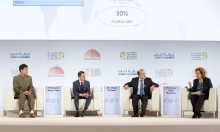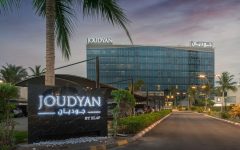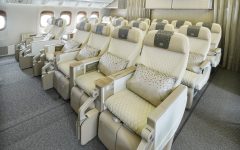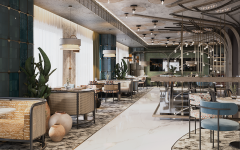 China’s Belt and Road initiative is expected to have major implications on trade and investment flows among Muslim countries, according to panellists addressing the topic at the Global Islamic Economy Summit 2018 (GIES) in Dubai. Entitled ‘One Belt, One Road, – How Might We Harness the Silk Route for the Islamic Economy?’, the panel highlighted the unprecedented opportunities for the Muslim nations that are located along the New Silk Road and examined the new growth opportunities that are opening up as the major infrastructure project progresses. Held under the patronage of His Highness Sheikh Mohammed bin Rashid Al Maktoum, Vice President and Prime Minister, the UAE and Ruler, Dubai, the fourth edition of GIES is organised by Dubai Chamber of Commerce and Industry and the Dubai Islamic Economy Development Centre in cooperation with Thomson Reuters as strategic partner. Held from October 30-31, 2018, GIES attarcted the participation of over 3,000 key decision makers, policymakers, government officials, business leaders and industry experts from around the world. Launched by Chinese President Xi Jinping in 2013, Belt and Road aims to improve connectivity and cooperation between Eurasian countries. During the session, Professor Nabil Baydoun, Vice Chancellor, Academic Affairs Hamdan Bin Mohammed Smart University, Dubai, spoke about the geographical importance of what is a new ‘Silk Route’ and how the project is an integral part of the Chinese plan for their economy. “It helps China increase trade among 65 countries and its biggest advantage is that it brings China closer to the world. Each nation needs to step up and play a part in working towards Belt and Road. Chinese regulations need to open the door to the world,” he said.
China’s Belt and Road initiative is expected to have major implications on trade and investment flows among Muslim countries, according to panellists addressing the topic at the Global Islamic Economy Summit 2018 (GIES) in Dubai. Entitled ‘One Belt, One Road, – How Might We Harness the Silk Route for the Islamic Economy?’, the panel highlighted the unprecedented opportunities for the Muslim nations that are located along the New Silk Road and examined the new growth opportunities that are opening up as the major infrastructure project progresses. Held under the patronage of His Highness Sheikh Mohammed bin Rashid Al Maktoum, Vice President and Prime Minister, the UAE and Ruler, Dubai, the fourth edition of GIES is organised by Dubai Chamber of Commerce and Industry and the Dubai Islamic Economy Development Centre in cooperation with Thomson Reuters as strategic partner. Held from October 30-31, 2018, GIES attarcted the participation of over 3,000 key decision makers, policymakers, government officials, business leaders and industry experts from around the world. Launched by Chinese President Xi Jinping in 2013, Belt and Road aims to improve connectivity and cooperation between Eurasian countries. During the session, Professor Nabil Baydoun, Vice Chancellor, Academic Affairs Hamdan Bin Mohammed Smart University, Dubai, spoke about the geographical importance of what is a new ‘Silk Route’ and how the project is an integral part of the Chinese plan for their economy. “It helps China increase trade among 65 countries and its biggest advantage is that it brings China closer to the world. Each nation needs to step up and play a part in working towards Belt and Road. Chinese regulations need to open the door to the world,” he said.
Professor Wang Yiwei, Director, Institute of International Affairs, Center for European Studies, Renmin University, China, discussed the critical role that Dubai could play in connecting Belt and Road with Africa and rest of the Middle East. He also drew on the Chinese and Islamic civilisations’ value systems relating to ecological issues around the Belt and Road initiative. “Belt and Road is about building a green, healthy and intelligent Silk Route, from focusing on cutting down CO2 emissions to figuring out alternatives to oil and gas, the drive has to be on solving the problems holistically and systematically and to use clear technology,” he said.
Dr Adnan Chilwan, Group Chief Executive Officer, Dubai Islamic Bank, UAE, said that Belt and Road is all about the “Globalisation of Civilisation.” “We are not just making a road, we are integrating the economic development of all the nations in the initiative of Belt and Road,” he said. “Since 27 of the 65 nations (along the route) are predominantly Muslim dominated and they have a tendency to lean towards Islamic banking, Islamic finance also has great liquidity value and can play as a catalyst to develop Belt and Road,” he said.
Breaking News
- IDeaS accelerates expansion in Saudi Arabia with Elaf Group Partnership
- Emirates expands its Premium Economy offering on services to Male and Colombo
- Hilton signs first Tapestry Collection by Hilton in Saudi Arabia with Al Musbah Group
- DCT Abu Dhabi and Abu Dhabi Hospitality Academy – Les Roches to Drive Next Chapter of Emirati Talent Development
- Dubai Airports launches DXB Greet & Go: a smart, QR code-based pickup service at Terminal 3
- Dubai’s experiential economy surges to Dh220 billion as The Experience Store sets out to redefine luxury wellness in the UAE
- Emirates signs MoU with Crypto.com for future integration of Crypto.com Pay as a payment option for customers
- Seychelles Tourism and TravTalk ME Host Power Breakfast in Dubai, Highlighting 16% GCC Growth
- Jordan rolls out the red carpet for extraordinary experiences in 2025
- Sojern joins forces with PubMatic to expand travel audience data curation
- Emirates reveals flight searches for summer travel increased by 7% compared to last year
 Tourism Breaking News
Tourism Breaking News


